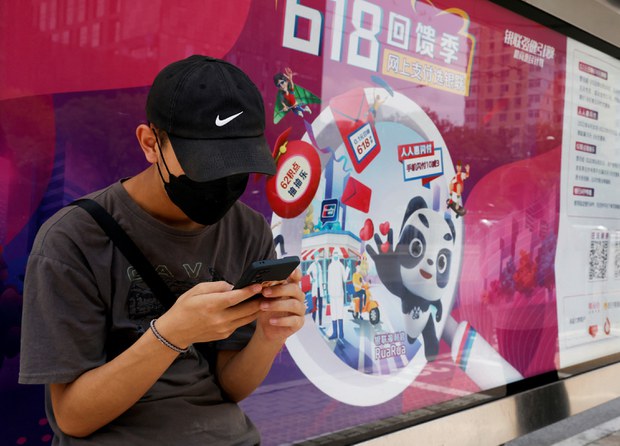China steps up social media censorship, ‘upgrades’ Great Firewall ahead of congress
Share

Internet users in China say that it is becoming more difficult to use virtual private networks (VPN) to evade the Great Firewall and read content blocked by government censors.
The ruling Chinese Communist Party (CCP) has stepped up its censorship of social media ahead of its five-yearly congress, with users complaining that it was no longer possible to “speak normally” using Douyin, Weibo and WeChat.
“I’m unable to have a normal conversation in any of my group chats with friends, relatives or classmates,” the Twitter account @observerincn tweeted on Oct. 4.
“I started to climb the Great Firewall [use circumvention software to use sites outside China], to find a place where we could talk normally, but none of my friends or relatives were there,” the account said.
“Inside the Great Firewall, the thing that prevents people from communicating normally, causing division and confrontation, isn’t just the fact that the internet has been hijacked by the devil,” it said. “It’s also the endless intimidation and abuse.”
A resident of the eastern province of Jiangsu surnamed Feng said several of her chat groups on WeChat have been blocked in recent days.
“A lot of groups are getting blocked,” Feng told RFA. “People are setting up up new groups.”
“My WeChat group was blocked and my friends stopped sending me messages,” she said. “It’s gotten much worse now; they are stopping people chatting in groups and among followers.”
“You can chat privately one-to-one,” Feng said.
One Twitter account replied to @observerincn, saying most blogs, podcasts and livestreams had now disappeared.
“There have been a lot of public security announcements that are now blatantly intimidating to ordinary people, telling them not to spread rumors or believe rumors,” the account said. “If you’re investigated, you will be clearly told that your children and even future generations will be seriously affected.”
“This is by no means an isolated case, but based on my own experience and that of several friends of mine.”
VPN crackdown
Feng said it is also getting harder for her to use a virtual private network (VPN) to scale the Great Firewall and read content that is blocked by government censors in China.
“I can’t [get over the wall]; it’s blocked and I can’t open FreeVPN,” she said. “This time, [the controls] are very strict.”
“The 20th National Congress is on Oct. 16, but police were contacting me and coming to my home as early as Aug. 15 to tell me they were starting stability maintenance measures.”
Internet technician Li Ming said China’s internet censorship had likely had a technological upgrade.
“VPNs and virtual private servers don’t seem to be blocked, but the use of … other types [of blocking] are more powerful now,” Li said. “They are blocking at the level of protocols, not servers, which probably mean they are capturing data packets.”
“Now, if you … enter an address, they block the data packets, which is different from before, so it’s probably an upgrade,” he said.
According to information security site Thousand Eyes, China has always used deep packet inspection as part of its intrusion detection system (IDS).
“If the IDS technology detects undesirable content and determines that a connection from a client to a web server is to be blocked, the router injects forged [reset code] into the data streams so that the endpoints abandon the connection,” it said.
“After blocking the connection, the system [blocks] further communication between the same pair of machines, even for harmless requests that would not previously have been blocked,” according to an analysis on the site.
“These timeouts can last for up to hours at a time and escalate if more attempts are made to access the censored content.”
If Li Ming’s observation were correct, the system would now be blocking data packets rather than just forcing connections to drop when they are detected.
Blocking outside users
Users outside China said they are also having difficulty using WeChat.
Former 1989 Tiananmen protest leader Wang Dan, said via Twitter that WeChat appeared to be preventing blocked users from outside China from chatting privately with users back home, a move which he termed “a new firewall.”
Wang said the move showed that the CCP continues to fear any free flow of information.
“Whatever they say about self-confidence this, self-confidence that is fake,” he said. “They are living in a turbulent world where they have to fear every shadow, all day, every day.”
A resident of Sichuan surnamed Zhao said he had noticed his posts on WeChat disappearing more often than before.
“Sometimes I post something with a slightly more sensitive title, but I can’t get it to send,” Zhao said. “Sometimes I will post something, but then, a short while later it’s gone, or only visible to me, not to others.”
WeChat, which is heavily relied upon by millions in China for anything from social contact and news updates to online shopping and fan sites, with 1.26 billion active users by the end of the third quarter of 2022.
WeChat’s parent company Tencent hadn’t responded to a request for comment by the time of writing.
Social media users are beginning to give up trying to use the platforms at all.
One user in the eastern province of Jiangxi said he had deleted his Weibo account, quit his WeChat groups, and doesn’t bother using any China-based chat apps at all any more.
Another user told RFA that he had quit all of his WeChat groups, but was re-added to a family group chat so he could stay in touch.
The powerful Cyberspace Administration of China said on Sept. 29 that is continuing to run operations labeling unconfirmed posts and comments as rumors, to “rectify the chaos of the rumor mill.”
It said internet workers at 12 platforms including Weibo, Douyin, Baidu, Tencent, Xiaohongshu, Bilibili, Zhihu and Douban had so far labeled 80,000 items as “rumors.”
Translated and edited by Luisetta Mudie.







